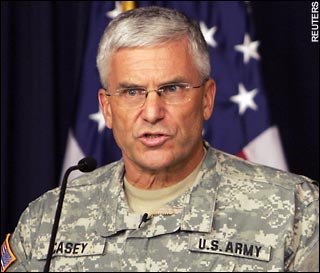 BBC : Iraq 'success' possible, US says
BBC : Iraq 'success' possible, US saysUS ambassador to Iraq Zalmay Khalilzad has said stabilising the country is possible in a realistic time-frame, despite ongoing sectarian violence.
He said there would be setbacks, but the goal of creating a multi-ethnic and multi-faith Iraq remained unchanged.
In a joint news conference, the US military commander in Iraq reaffirmed his belief that Iraqi forces could take over security within 18 months.
The statements came amid speculation over Washington's strategy over Iraq.
At least 90 US troops have died in fighting this month - the highest monthly toll since November 2004
 Guardian : Bush drops 'stay the course' slogan as political mood sours
Guardian : Bush drops 'stay the course' slogan as political mood soursThe White House, meanwhile, announced that George Bush had stopped using the slogan, "Stay the course", while the president himself hammered a new buzzword: "Change". "We're constantly changing. The enemy changes, and we change. The enemy adapts to our strategies and tactics, and we adapt to theirs. We're constantly changing to defeat this enemy," he said, after visiting a Florida company making a device for sniffing out roadside bombs.
"I don't hear anything that would suggest change in policy, just a restatement of it," Rand Beers, a former strategist in the Bush administration's national security council, said, pointing out that there had been previous promises about Iraqi troop training and political reforms.
In an indication of the mounting pressure for a change of course, the New York Times yesterday devoted its entire leader column to calling for a new solution to the "disaster" of Iraq and the sacking of the defence secretary, Donald Rumsfeld.
 CTV : General says U.S. may send more troops to Iraq
CTV : General says U.S. may send more troops to IraqIraqi forces should be able to take command of security in the country within the next 12 to 18 months, the U.S. military commander in Iraq said Tuesday. But that could mean initially deploying more American troops to the region.
"I very strongly believe that we need to continue to reduce our forces as the Iraqis continue to improve because we need to get out of their way," Gen. George Casey said Tuesday at a rare joint conference with the U.S. Ambassador in Baghdad.
"The Iraqis are getting better, their leaders are feeling more responsible for the security in Iraq, and they want to take the reins.
But Casey said he would not hesitate to ask for more troops if he felt they were necessary to improve the basic necessities for Iraqis living in Baghdad. Some of those troops could come from outside the country.
"Now, do we need more troops to do that? Maybe. And, as I've said all along, if we do, I will ask for the troops I need, both coalition and Iraqis," said Casey.
About 144,000 U.S. forces are currently operating in Iraq.
 Telegraph : US officials seek to calm voters on security handover
Telegraph : US officials seek to calm voters on security handoverThe new "national compact" would lay out a series of benchmarks that, if achieved, would restore stability and allow coalition forces to withdraw within a "reasonable" time frame.How do you like this photo of General Casey? Talk about calming the voters! How quaint!!
These would include disbanding militias, making changes to the constitution and a new agreement on sharing the country's oil wealth among its sectarian and ethnic groups.
With mid-term elections to be held in the US next month, polls show that voters consider Iraq to be the number one issue and only one in five believes the war is being won.
In a direct appeal to the American people, Mr Khalilzad said the struggle to save Iraq from extremists was "the defining challenge of our era".
Nowhere have I seen any mention of American withdrawal, save in a Time Magazine article which mentioned that nowhere had anyone mentioned withdrawal.
Nowhere have I seen any mention of the fact that the Iraqis are now being tasked with quelling the so-called sectarian violence caused by the death squads that were funded, equipped, trained and motivated by a special department of the Pentagon.
Good old American foreign policy: we start a civil war, install a puppet government, and then insist that they solve the problem we created. Sometimes it can be done, sometimes it cannot. Ask Guatemala.